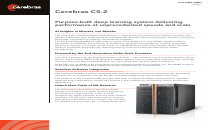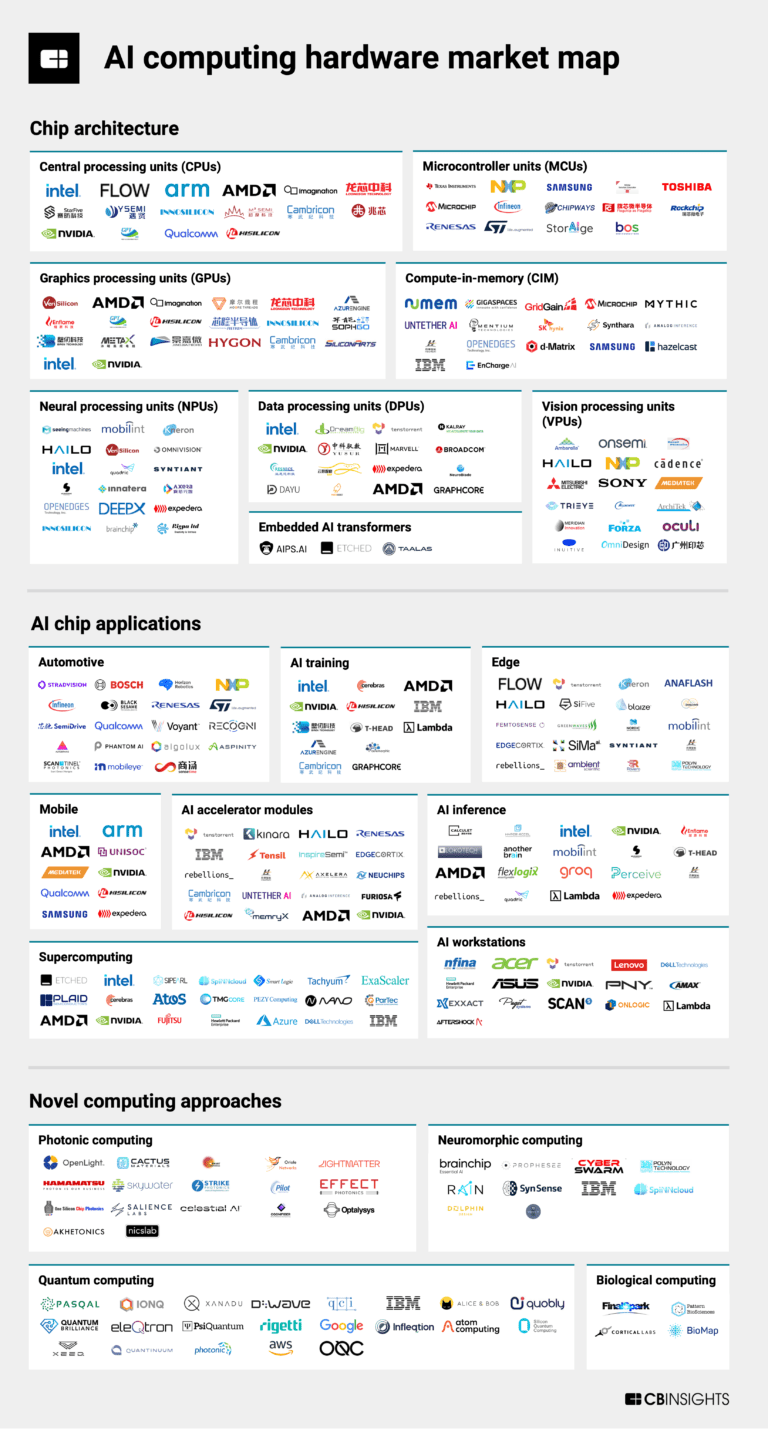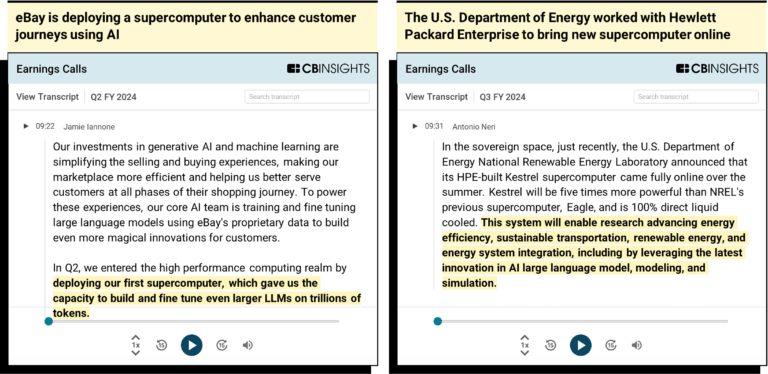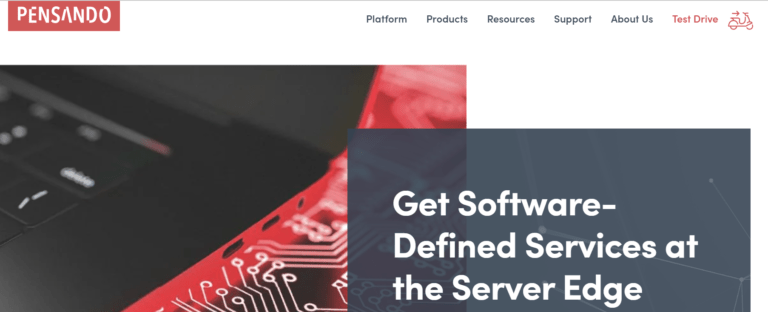
Cerebras
Founded Year
2016Stage
Secondary Market - II | AliveTotal Raised
$718MMosaic Score The Mosaic Score is an algorithm that measures the overall financial health and market potential of private companies.
-70 points in the past 30 days
About Cerebras
Cerebras focuses on artificial intelligence (AI) work in computer science and deep learning. The company offers a new class of computers, the CS-2, which is designed to train AI models efficiently with applications in natural language processing (NLP), computer vision, and computing. Cerebras primarily serves sectors such as health and pharma, energy, government, scientific computing, financial services, and web and social media. It was founded in 2016 and is based in Sunnyvale, California.
Loading...
Cerebras's Product Videos


ESPs containing Cerebras
The ESP matrix leverages data and analyst insight to identify and rank leading companies in a given technology landscape.
The supercomputer developers market focuses on the companies and institutions building supercomputers, often called high-performance computing systems. These systems are advanced computing machines that handle complex scientific, engineering, and research applications. They enable faster processing of large-scale datasets, facilitate advanced analytics, and support scientific breakthroughs. Superc…
Cerebras named as Challenger among 10 other companies, including Microsoft Azure, IBM, and Advanced Micro Devices.
Cerebras's Products & Differentiators
Cerebras CS-3 AI Accelerator
The Cerebras CS-3 will be announced in March 2024 and is an AI accelerator powered by the largest processor ever built, the third-generation Cerebras Wafer Scale Engine (WSE). Built at the 5nm node, the WSE-3 will more than double the performance of the WSE-2. WSE-3 will once again be the world’s fastest AI processor – it is an order of magnitude faster and more capable than the latest Nvidia GPU and 2x faster than the CS-2.
Loading...
Research containing Cerebras
Get data-driven expert analysis from the CB Insights Intelligence Unit.
CB Insights Intelligence Analysts have mentioned Cerebras in 3 CB Insights research briefs, most recently on Nov 7, 2024.

Sep 13, 2024
The AI computing hardware market mapExpert Collections containing Cerebras
Expert Collections are analyst-curated lists that highlight the companies you need to know in the most important technology spaces.
Cerebras is included in 6 Expert Collections, including Unicorns- Billion Dollar Startups.
Unicorns- Billion Dollar Startups
1,261 items
AI 100
199 items
Winners of CB Insights' annual AI 100, a list of the 100 most promising AI startups in the world.
Game Changers 2018
70 items
Semiconductors, Chips, and Advanced Electronics
7,286 items
Companies in the semiconductors & HPC space, including integrated device manufacturers (IDMs), fabless firms, semiconductor production equipment manufacturers, electronic design automation (EDA), advanced semiconductor material companies, and more
Future of the Factory (2024)
436 items
This collection contains companies in the key markets highlighted in the Future of the Factory 2024 report. Companies are not exclusive to the categories listed.
Artificial Intelligence
7,222 items
Cerebras Patents
Cerebras has filed 61 patents.
The 3 most popular patent topics include:
- artificial intelligence
- machine learning
- parallel computing

Application Date | Grant Date | Title | Related Topics | Status |
|---|---|---|---|---|
2/23/2018 | 3/19/2024 | Artificial neural networks, Machine learning, Artificial intelligence, Deep learning, Parallel computing | Grant |
Application Date | 2/23/2018 |
|---|---|
Grant Date | 3/19/2024 |
Title | |
Related Topics | Artificial neural networks, Machine learning, Artificial intelligence, Deep learning, Parallel computing |
Status | Grant |
Latest Cerebras News
Feb 4, 2025
News provided by Share this article Share toX NEW YORK, Feb. 3, 2025 /PRNewswire/ -- Report with market evolution powered by AI - The global artificial intelligence (AI) chips market size is estimated to grow by USD 902.6 billion from 2025-2029, according to Technavio. The market is estimated to grow at a CAGR of over 81.2% during the forecast period. Increased focus on developing AI chips for smartphones is driving market growth, with a trend towards convergence of AI and IoT. However, dearth of technically skilled workers for ai chips development poses a challenge. Key market players include Advanced Micro Devices Inc., Baidu Inc., Broadcom Inc., Cerebras, Fujitsu Ltd., Google LLC, Graphcore Ltd., Huawei Technologies Co. Ltd., Intel Corp., International Business Machines Corp., MediaTek Inc., Microchip Technology Inc., NVIDIA Corp., NXP Semiconductors NV, Qualcomm Inc., SambaNova Systems Inc., Samsung Electronics Co. Ltd., SenseTime Group Inc., Taiwan Semiconductor Manufacturing Co. Ltd., and Tesla Inc.. Technavio has announced its latest market research report titled Global Artificial Intelligence (AI) Chips Market 2025-2029 Key insights into market evolution with AI-powered analysis. Explore trends, segmentation, and growth drivers- View Free Sample PDF Artificial Intelligence (AI) Chips Market Scope Report Coverage Key companies profiled Advanced Micro Devices Inc., Baidu Inc., Broadcom Inc., Cerebras, Fujitsu Ltd., Google LLC, Graphcore Ltd., Huawei Technologies Co. Ltd., Intel Corp., International Business Machines Corp., MediaTek Inc., Microchip Technology Inc., NVIDIA Corp., NXP Semiconductors NV, Qualcomm Inc., SambaNova Systems Inc., Samsung Electronics Co. Ltd., SenseTime Group Inc., Taiwan Semiconductor Manufacturing Co. Ltd., and Tesla Inc. Market Driver Artificial Intelligence (AI) is revolutionizing industries from healthcare to retail, finance, and automotive with deep learning and machine learning algorithms. The demand for AI technologies is driving the growth of AI chips market. Companies like Advanced Micro Devices, Nvidia, and Huawei are leading the way with AI chip lines, such as Trainium2 and A100 chip, designed for high computing and parallel processing. Quantum computing and generative AI are the next frontiers. Hardware components like CPUs, GPUs, FPGAs, and ASICs are essential for AI technologies. Energy efficiency is a key consideration, with AI chipmakers focusing on highbandwidth memory and system on chip designs. Cloud providers like Microsoft Azure, Amazon Web Services, and Google Cloud offer AI services, while edge computing enables real-time applications on Edge devices. Ethical concerns around AI use are rising, with specific integrated circuits and multichip modules being developed to address these issues. AI data centers and cognitive computing are powering AI applications in various sectors, including healthcare, retail, finance, automotive, and manufacturing. Patent filings for AI technologies continue, with potential applications in mobile health monitoring, elderly population care, and image recognition. The future of AI lies in the intersection of AI, robotics, and quantum computing, with potential use cases in autonomous vehicles, IoT devices, and Industry 4.0. The market for AI chips is expected to grow significantly, with investments in research and development and collaboration between tech giants and startups. However, system failure and malfunctioning remain challenges, with ongoing efforts to improve reliability. The Internet of Things (IoT) market is experiencing significant growth due to the advantages it offers in various industries, including aerospace and defense, automotive, consumer electronics, healthcare, and more. IoT devices make decisions using data they receive, eliminating the need for human intervention. To enhance their capabilities, IoT device manufacturers integrate Human-Machine Interface (HMI) technologies into devices such as cameras, drones, smart speakers, smartphones, smart TVs, and others. This integration leads to the deployment of Artificial Intelligence (AI) chips in IoT devices, enabling power-efficient data processing and machine learning computation. The high demand for IoT devices and the integration of AI chips make the AI Chips Market a lucrative business opportunity. Request Sample of our comprehensive report now to stay ahead in the AI-driven market evolution! Market Challenges Artificial Intelligence (AI) is revolutionizing industries from healthcare to retail, finance, and automotive. However, the growing demand for advanced AI technologies, including deep learning and robotics, poses challenges for hardware components like AI chips. Traditional CPUs, GPUs, FPGAs, and ASICs struggle to meet the high computing requirements of AI algorithms and machine learning models. Leading tech companies like Advanced Micro Devices, Nvidia, and Huawei are investing in AI chip lines to address these challenges. For instance, Nvidia's A100 chip and Huawei's Ascend 910B chipset are designed for AI data centers, while the Trainium2 chip focuses on edge computing. Energy efficiency is another concern, as AI applications, such as generative AI and large language models, require massive data processing. Highbandwidth memory and quantum computing are potential solutions, but they present their own challenges. Moreover, ethical concerns surrounding AI technologies, such as system failure and malfunctioning, require careful consideration. Edge computing and centralized cloud servers offer alternatives for real-time applications and reducing latency. AI applications span various industries, including healthcare, retail, finance, and automotive. Ethical concerns and energy efficiency challenges must be addressed to ensure the widespread adoption of AI technologies. AI technologies like cognitive computing, machine intelligence, image recognition, and pose detection are transforming industries, from healthcare to retail, finance, automotive, and more. Patent filing and system failure are concerns, but the potential benefits far outweigh the challenges. AI technologies are also being integrated into everyday devices, such as mobile phones, personal computers, gaming consoles, and even wearable devices and smart homes. Theoretical and algorithmic basis, visual understanding, and automatic analysis are essential for these applications. In conclusion, the AI chip market is experiencing significant growth, driven by the increasing demand for AI technologies in various industries. However, challenges related to energy efficiency, ethical concerns, and system failure must be addressed to ensure the widespread adoption of AI technologies. Companies are investing in AI chip lines, such as Nvidia's A100 chip and Huawei's Ascend 910B chipset, to meet the demands of AI applications in industries like healthcare, retail, finance, and automotive. Edge computing and centralized cloud servers offer alternatives for real-time applications and reducing latency. The future of AI technologies is bright, with potential applications in manufacturing machines, processors, GPUs, FPGAs, CPUs, DSPs, microcontrollers, frame buffers, display devices, and programmable logic chips. The AI chips market is experiencing significant growth due to the potential revenue increases that companies can achieve through artificial intelligence implementation. However, the market's expansion is hindered by a shortage of skilled professionals with expertise in AI technology. The high research and development costs associated with AI integration and the lack of available talent pose challenges for enterprises. To address this issue, companies must carefully evaluate the benefits and requirements before implementing AI solutions. The scarcity of experienced AI professionals is currently the greatest barrier to the widespread adoption of AI within business operations. Segment Overview Product Others 1.1 ASICs- Artificial Intelligence (AI) chips are experiencing significant growth due to the increasing adoption of application-specific integrated circuits (ASICs) in data centers. ASICs are customized, non-configurable chips that offer faster performance than GPUs and FPGAs. Google's Tensor Processing Unit (TPU) is an example of an ASIC designed for deep neural networks. TPUs provide higher performance and speed compared to GPUs, FPGAs, and CPUs. The TPU is a network of software and hardware that learns specific tasks by analyzing large data sets. TensorFlow, an open-source machine learning library, is used with TPUs to develop new algorithms. ASIC-based AI chips are gaining market share due to their ability to offer superior performance and speed in data center applications. The use of ASICs in cloud-based data centers is driving the growth of the AI chips market. Download a Sample of our comprehensive report today to discover how AI-driven innovations are reshaping competitive dynamics Research Analysis Artificial Intelligence (AI) Chips Market: The global AI Chips Market is experiencing significant growth due to the increasing adoption of AI technologies in various industries. Deep learning and machine learning algorithms are driving the demand for AI chips, which are specialized hardware components designed to accelerate AI computations. AI chips include specific integrated circuits like CPUs, GPUs, FPGAs, and system on chips. Quantum computing is also expected to revolutionize AI technologies, leading to the development of advanced AI chips. The market is witnessing innovation with the introduction of new AI chips like Trainium2, designed for high-performance AI applications. Industries such as healthcare, retail, finance, automotive, and IoT devices are major consumers of AI chips. Ethical concerns surrounding AI are also pushing the need for more advanced AI chips to ensure transparency and accountability. The market is segmented into cloud and edge computing, with the edge computing segment expected to grow due to the increasing demand for real-time AI processing. Highbandwidth memory is another crucial component in the development of advanced AI chips. The market is expected to grow significantly in the coming years, with new applications and use cases emerging in robotics, autonomous vehicles, and generative AI. Market Research Overview Artificial Intelligence (AI) Chips Market: Overview The AI Chips Market is a rapidly growing sector driven by the increasing demand for advanced AI technologies, including deep learning and machine learning, in various industries. AI Chips are specialized hardware components designed to accelerate AI algorithms and technologies, such as neural networks, quantum computing, and cognitive computing. These chips are integral to powering AI applications in robotics, computer vision, natural language processing, and other fields. The market for AI Chips encompasses a range of hardware components, including CPUs, GPUs, FPGAs, ASICs, DSPs, and microcontrollers. Companies are investing heavily in research and development to create more energy-efficient and high-performance AI chips to meet the demands of real-time applications and big data processing. Key trends in the AI Chips Market include the development of AI chip lines, such as Nvidia's A100 chip and Ascend 910B chipset, and H200 chipset, as well as the integration of highbandwidth memory and other advanced technologies. The market is also seeing the emergence of edge computing and the use of AI in centralized cloud servers and edge devices, such as mobile phones and IoT devices. Applications of AI Chips span various industries, including healthcare, retail, finance, automotive, and manufacturing. Ethical concerns surrounding AI and the potential for system failure or malfunctioning are also driving the need for more advanced and reliable AI chips. The market is expected to continue growing as AI technologies become increasingly integrated into everyday life, from health monitoring and personalized health to smart homes, connected cars, and manufacturing machines. The theoretical and algorithmic basis of AI technologies, including deep learning and machine learning, continue to evolve, with advancements in image recognition, pose detection, behavioral patterns, and structured data analysis. Patent filing and innovation are key drivers in the AI Chips Market, with companies investing in research and development to stay ahead of the competition. The market for AI Chips is diverse and dynamic, with applications ranging from mobile phones and embedded systems to personal computers, gaming consoles, and data centers. The future of AI Chips lies in their ability to provide high computing power, parallel processing, and energy efficiency, making them essential for powering the next generation of AI technologies and applications. Table of Contents: About Technavio Technavio is a leading global technology research and advisory company. Their research and analysis focuses on emerging market trends and provides actionable insights to help businesses identify market opportunities and develop effective strategies to optimize their market positions. With over 500 specialized analysts, Technavio's report library consists of more than 17,000 reports and counting, covering 800 technologies, spanning across 50 countries. Their client base consists of enterprises of all sizes, including more than 100 Fortune 500 companies. This growing client base relies on Technavio's comprehensive coverage, extensive research, and actionable market insights to identify opportunities in existing and potential markets and assess their competitive positions within changing market scenarios. Contacts
Cerebras Frequently Asked Questions (FAQ)
When was Cerebras founded?
Cerebras was founded in 2016.
Where is Cerebras's headquarters?
Cerebras's headquarters is located at 1237 East Arques Avenue, Sunnyvale.
What is Cerebras's latest funding round?
Cerebras's latest funding round is Secondary Market - II.
How much did Cerebras raise?
Cerebras raised a total of $718M.
Who are the investors of Cerebras?
Investors of Cerebras include CrossWork, Fabrica Ventures, Eclipse Ventures, Benchmark, Coatue and 14 more.
Who are Cerebras's competitors?
Competitors of Cerebras include Blaize, Tenstorrent, Neural Magic, Groq, Graphcore and 7 more.
What products does Cerebras offer?
Cerebras's products include Cerebras CS-3 AI Accelerator and 3 more.
Who are Cerebras's customers?
Customers of Cerebras include GlaxoSmithKline, Argonne National Laboratory, Mayo Clinic, National Energy Technology Laboratory and Pittsburgh Supercomputing Center.
Loading...
Compare Cerebras to Competitors

Tenstorrent is a computing company specializing in hardware focused on AI within the technology sector. The company offers computing systems for the development and testing of AI models, including desktop workstations and rack-mounted servers powered by its Wormhole processors. Tenstorrent also provides an open-source software platform, TT-Metalium, for customers to customize and run AI models. It was founded in 2016 and is based in Toronto, Canada.

Mythic is an analog computing company that specializes in AI acceleration technology. Its products include the M1076 Analog Matrix Processor and M.2 key cards, which provide power-efficient AI inference for edge devices and servers. Mythic primarily serves sectors that require real-time analytics and data throughput, such as smarter cities and spaces, drones and aerospace, and AR/VR applications. Mythic was formerly known as Isocline Engineering. It was founded in 2012 and is based in Austin, Texas.

Another Brain operates as a company focusing on the development of artificial intelligence (AI) technologies. It specializes in the development of Organic AI, a new generation of artificial intelligence technology within the AI industry. The company offers a vision quality control solution called Blue Phosphor that uses AI algorithms for intelligent defect detection in industrial supply chains. It was founded in 2017 and is based in Paris, France.

BITMAIN manufactures the digital currency mining sector, specializing in mining servers. The company offers technology power efficiency and provides computational infrastructure solutions to the global blockchain network. It primarily serves the cryptocurrency mining industry. It was founded in 2013 and is based in Beijing, China.
Wave Computing is a company focused on revolutionizing artificial intelligence through its dataflow-based chips, systems, and software in the technology sector. The company's main offerings include high-performance, scalable, and power-efficient processors based on the RISC-V instruction set architecture, designed for high-end applications. These processors are primarily used in the automotive, high-performance computing and data center, and communications and networking sectors. It is based in Campbell, California.
Vathys specializes in the development of deep learning processors within the semiconductor industry. The company offers processors designed to address inefficiencies in data movement, focusing on overcoming the data movement bottleneck while also increasing compute power. It is based in Portland, Oregon.
Loading...

